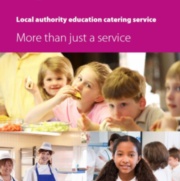'5-a-ways' to fix school meal provision and narrow inequalities in health, wellbeing and educational attainment
Informed by a series of online surveys and a roundtable discussion, the report found that over half of those surveyed believed Free School Meal (FSM) funding was inadequate. The vast majority (83.16%) of respondents stated that the funding for FSMs should be ringfenced and the survey also confirmed that less than half of councils surveyed are providing a subsidy for their catering service (41.30%).
As well as survey analysis, the report documents the fragmentation of the English school meals sector, scrutinises the current landscape of local authority service delivery models, and affirms the local authority catering service as the most effective model for delivering nutritious school meals.
APSE’s call for action takes the form of five recommendations for national governments: ‘Your 5-a-ways to fix school meal provision’:
- The wide-reaching socio-economic value of school catering needs to be recognised.
- Funding should reflect the broader value of school catering rather than simply the cost of the school meal.
- Funding for school meals needs to be ringfenced.
- Market-based models do not serve the sector well and ought to be re-evaluated.
- Subsidy is not a dirty word.
Speaking about the findings, Vickie Hacking, APSE Principal Advisor and lead researcher, said:
“Over the years, the local authority catering service has often been expected to be financially viable in a traded service context. As such, the wide-reaching social value of the provision of school meals and the role that councils play has been lost in the narrative.
“The provision of a hot nutritious school meal will not on its own alleviate child poverty, reduce obesity, improve the economic growth of an area or solve climate change. However, it can form a big part of the solution as the humble school meal is beneficial to the health and education of the child and supports the wider family especially during the current cost of living crisis.
“There are wider economic and social value benefits of paying predominantly part-time women workers a higher living wage and offering terms and conditions that are more generous than other employers in the sector. Working with and supporting local suppliers through procurement also generates significant social and economic benefits for the local area.”
The full report ‘Local authority education catering service: More than just a service’ is free to download from the APSE website here.
NOTES TO EDITOR
- This research was informed by online surveys pertaining to the provision and the impact of the cost-of-living crisis which were sent to officers and elected members that work within or have knowledge of the school catering service in councils from England, Scotland, Wales and also the Northern Ireland Education Authority. Further data was collected at an expert roundtable to gain a frontline view of the challenges the service is facing. Information provided at APSE Remobilisation Groups and Advisory Groups was also used in this report.
- The Association for Public Service Excellence (APSE) is a not-for-profit local government body working with over 300 councils throughout the UK. Promoting excellence in public services, APSE is the foremost specialist in local authority frontline services and operates one of the UK’s largest research programmes in local government policy and frontline service delivery matters.
- For further press enquiries, or to arrange an interview, please contact APSE Acting Principal Advisor Matt Ellis on [email protected]


.png)



.png)